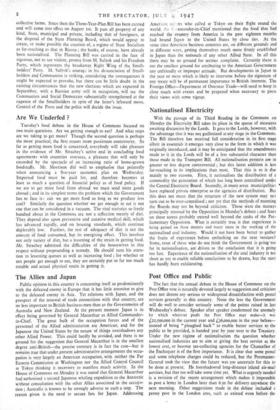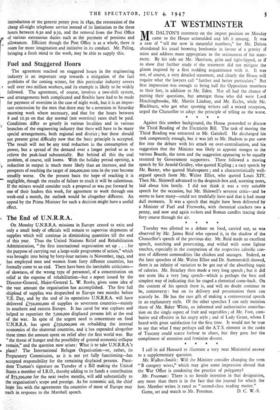Post Office and Public
The fact that the annual debate in the House of Commons on the Post Office vote is naturally devoted largely to suggestion and criticism does not denote any serious or widespread dissatisfaction with postal services generally in this country. None the less the Government will do well to consider seriously some of the points raised in last Wednesday's debate. Speaker after speaker condemned the anomaly by which whatever profit the Post Office may make—it was L22,500,000 in the current year and L36,000,000 in the year before— instead of being " ploughed back " to enable better services to the public to be provided, is handed year by year over to the Treaiiny. Under the new regime of nationalisation the question whether nationalised industries are to aim at giving the best service at the lowest cost, or become tax-collecting agencies for the Chancellor of the Exchequer is of the first importance. It is clear that some postal and some telephone Charges could be reduced, but the Postmaster- General took the view that the future was too uncertain for this to be done at present. He foreshadowed long-distance inland air-mail services, but that too will take some time yet. What is urgently needed is a revision of the recent arrangement which makes it impossible to post a letter in London later than 6.30 for delivery anywhere the next morning. Other suggestions made in the debate included a penny post in the London area, such as existed even before the introduction of the general penny post in i84o, the restoration of the cheap all-night telephone service instead of its limitation to the three hours.between 6.30 and 9.3o, and the removal from the Post Office of various extraneous duties such as the payment of pensions and „ allowances. Efficient though the Post Office is as a whole, there is room for more imagination and initiative in its conduct: Mt. Paling, bringing a fresh mind to the work, may be able to supply this.







































 Previous page
Previous page